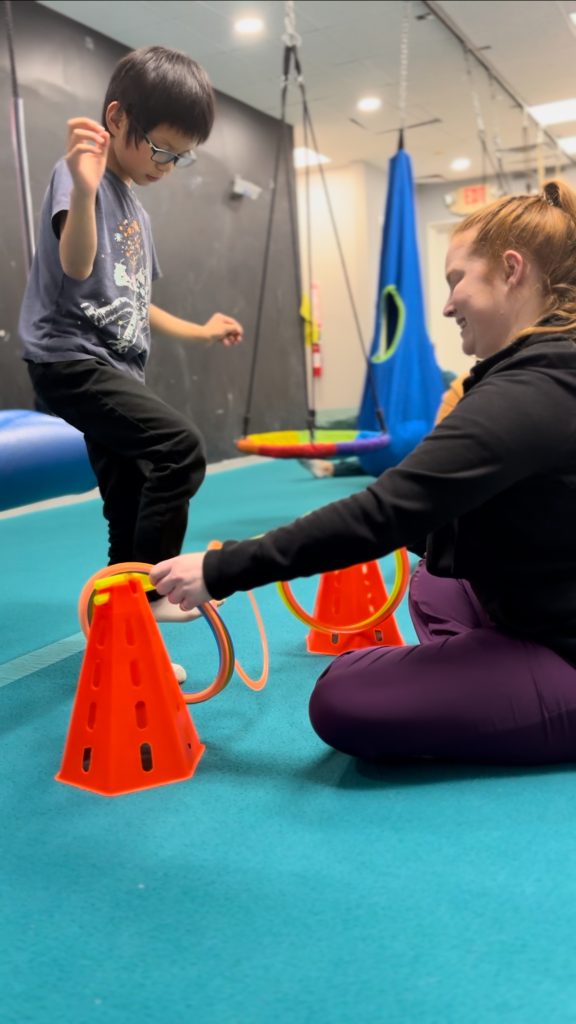
Ms. Marissa and a friend are working on balance & coordination!
Finding Your Footing: Balance Difficulties and Tips for Coordination
By Team Therapy Smarts
We all know that kids will take a tumble every now and then! These types of mishaps are most common in young toddlers as they find their footing for the first time. But with an estimated 1 in 20 children in the US facing dizziness or balance difficulties, how can you tell the difference between these challenges and childhood clumsiness?
Many different systems work together to keep us upright, including our brain, ears, eyes, joints and muscles. Our sense of balance is largely controlled by our vestibular system— made up of sensory organs in our inner ear that determine how both we and the world around us are moving.
Because of the number of systems involved with keeping our balance, disorders can be difficult to diagnose. It may be difficult for children to describe how they feel, and some indicators may be attributed to other causes. Below, we’ve shared a list of common symptoms and tips for encouraging coordination.
Symptoms of Balance Difficulties
People of any age can be diagnosed with a balance disorder, and symptoms can range from mild to severe. While younger children may struggle to express how they feel, older kids may complain of feeling dizzy, lightheaded or disoriented.
In general, symptoms of a balance disorder may include:
Difficulties with standing, walking, turning corners or climbing stairs without stumbling or falling.
Walking with a wide stance, or being unable to walk without staggering or holding onto something.
Experiencing vertigo, or the feeling that things around you are moving. Kids may describe this sensation as spinning, swinging, sliding or being on a merry-go-round.
Because the vestibular system is integrated within our ears, balance problems can often accompany hearing loss or other hearing difficulties. Children may experience muffled hearing, or a sense of pressure and fullness in their ears. They could also experience tinnitus, or the sensation of ringing, humming or whirring in your ear. Any combination of these symptoms can also come across as concentration or focus difficulties, particularly in a school environment.
Balance Difficulties Treatment
Physical therapy can be beneficial to children experiencing balance difficulties. A physical therapist is equipped to perform assessments of your child’s movement, strength, coordination, visual tracking and balance. They may also recommend external evaluations to rule out causes like poor eyesight or medication side-effects.
As part of their evaluation process, a physical therapist will also likely evaluate your child’s sense of proprioception. Proprioception is our sense of our body’s position, withoutthe use of our eyesight. Based on their findings, your physical therapist will then prescribe specific treatment recommendations to address the areas where your child struggles most. This may include exercises focusing on strength and flexibility, retaining good posture, balancing or following their eye tracking.
Exercises won’t be as one-note as standing on one foot! Check out this fun ring game our physical therapist Ms. Marissa set up for a friend to work on his balance and bilateral coordination:
Improving Coordination at Home
The best way to improve balance at home for your child is to turn it into a game! If your child struggles with his or her balance, consider breaking out a few of these at-home activities to practice their coordination:
Hopscotch: This playground classic requires dynamic balance — or the ability to balance while in-motion— as your child hops between squares. Break out your sidewalk chalk and create a simple course. For an added challenge, players can try completing the course backwards!
Freeze Dance: Crank up your kid’s favorite song and bust a move together! When the music pauses, all players have to remain in their positions until it starts again— giving valuable practice for their balancing skills.
Catch: Sometimes, Even simple games can teach critical skills! Playing catch requires hand-eye coordination, concentration, and keeping your balance when catching or throwing. With this game at the core of so many beloved sports, it can teach your children valuable skills that may unlock a brand-new hobby!
If your child is facing delayed milestones and struggling to maintain their balance, you are not alone and help is available. Here at Therapy Smarts, our mission is to turn challenges into triumphs, and we have the tools and expertise to empower your child and equip your family to help them achieve their goals. Give us a call at (919) 378-1340to set up an appointment, today!


